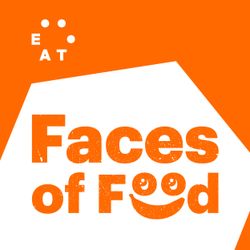Faces Of Food
All Episodes

Food Can Fix It - trailer
01:02||Season 1Welcome to the Food Can Fix It podcast, a podcast produced by EAT. In this podcast, we will be interviewing chefs, politicians, entrepreneurs and more to listen to their insight regarding how we can revolutionise our food system.Learn more at EATforum.org
1. Empowering Rural Women & Youth - with IFAD President Gilbert Houngbo
24:34||Season 1, Ep. 1Born and raised in rural Togo, Gilbert F. Houngbo, President of the International Fund for Agricultural Development, has spent more than 30 years working to improve the lives of some of the world’s most vulnerable people. We caught up with him in Stockholm to discuss the importance of investing in women, how his upbringing has shaped his passion for working with smallholder farmers and why it’s time for the international community to stop the talk and start walking the walk on making youth in rural areas a priority.Learn more at EATforum.org
2. Sustainability Starts in Your Own Home - with chefs Manal Alalem and Anahita Dhondy
25:00||Season 1, Ep. 2This week Food Can Fix It is joined by two activist chefs, Manal Alalem from Egypt and Anahita Dhondy from India. The two have vastly different backgrounds, but they’re united in a common passion for spreading knowledge about their traditional cuisine, championing women’s participation in the culinary industry and doing their bit to help us reach of the UN Sustainable Development Goals. Manal and Anahita came to the EAT Stockholm Food Forum as representatives of the Chef’s Network, a global group of chefs who are working to create a better food system for all.Learn more at EATforum.org
3. Why Investors Care About Bees - with Aviva's Abigail Herron
18:19||Season 1, Ep. 3Abigail Herron, Global Head of Responsible Investment at Aviva Investors, which manages close to USD 0.5 trillion worth of assets, are today's guest. We discuss why investors are increasingly paying attention to the financial risks connected to factory farming, oceanic plastic, anti-microbial resistance and the global decline of pollinators. There are significant risks to the way we produce our food that are lurking in the blind spots of the world’s capital markets. Left unchecked, these risks could have potential financial impacts running into trillions of dollars. Abigail tells us how Aviva is working with the financial community to help us towards a more sustainable, well-fed, future.Learn more at EATforum.org
4. The Good Shift Diet - with Stockholm Resilience Center's Line Gordon
22:50||Season 1, Ep. 4Today’s guest is Line Gordon, the newly appointed director of the Stockholm Resilience Center – EAT’s scientific partner. We talked to Line about why water is the “bloodstream of the biosphere”, the power of consumers and how we need to adjust our eating habits to make them both healthier and sustainable. However, Line is not a believer in cutting meat and dairy out altogether. Livestock has an important role to play in our food system, both from a livelihood and a biodiversity perspective. Instead, she recommends what she calls The Good Shift, key words for which are quality, culture and culinary innovators.Learn more at EATforum.org
5. Breaking Food Barriers - with Chef Ali L'artiste
19:34||Season 1, Ep. 5Ali Said Mandhry, popularly known as Chef Ali L’artiste – a Kenyan Celebrity Chef, TV/Radio personality and culinary instructor, is today's guest. Ali’s love of food came early: he began cooking at the age of seven and by the time he’d turned 12, he had his own business selling cakes. Today Ali champions Kenyan cuisine both nationally and internationally, and is part of IFAD's Recipes for Change campaign, which raises awareness about the impacts of climate change on food crops and traditional recipes. He came to the EAT Stockholm Food Forum as a representative of the Chef’s Network, a global network of chefs who are working to create a better food system for all. We talked to him about gender stereotypes in the culinary arts, breaking food barriers and empowering small-scale farmers.Learn more at EATforum.org
6. The Malnutrition Cocktail Cities Are Serving - with Tom Arnold and Emily Norford
20:18||Season 1, Ep. 6Today we’re talking to Tom Arnold, Member of the Global Panel on Agriculture and Food systems for Nutrition, and EAT’s Policy Officer Emily Norford about how rapidly rising urbanization in low and middle-income countries is adversely affecting diets and health. We explore the role regulators, private sector and civil society can play to promote healthier urban food environments and what one can learn from measures introduced by cities like Copenhagen, Quito and Vancouver ranging from public procurement of organic food to urban agriculture programs.Learn more at EATforum.org
7. Green Investing - with Nordea's Thina Saltvedt
23:16||Season 1, Ep. 7Thina Saltvedt, formerly one of Norway’s most profiled oil analysts and now a senior advisor for Sustainable Finance at Nordea Bank, the largest banking group in the Nordic region, is our guest today. Thina talked to us about what prompted her career switch, why the financial industry needs to become more vocal on how it will contribute to global climate change mitigation and what lessons the food industry can learn from the transition the energy sector is undergoing.Learn more at EATforum.org
8. Fighting Malnutrition in the Midst of Plenty - with Peruvian Civil Society Leaders Biaggioni and Salcedo
32:04||Season 1, Ep. 8Two Peruvian activists join us today: chef Karissa Becerra Biaggioni who founded the NGO La Revolucion, which is all about educating children about real food, and Sandra Salcedo who initiated Sobremesa, an initiative led by women in the gastronomy sector to support the SDGs. We talked to them about retraining children’s taste buds, educating the Ministry of Education, making the industry step up to the plate and malnutrition in the midst of abundant availability of fresh produce.Learn more at EATforum.org
loading...